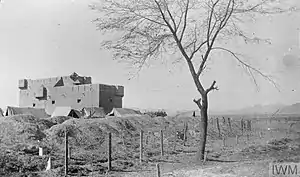| Mohmand blockade | |||||||
|---|---|---|---|---|---|---|---|
| Part of World War I | |||||||
 Police post built in the corner of Subhan Khwar Camp, as part of the Mohmand blockade, on the road between Fort Shabkadar and Michni | |||||||
| |||||||
| Belligerents | |||||||
| Mohmand Tribe | |||||||
The Mohmand blockade (1916–1917) was a blockade formed by a series of blockhouses and barbed wire defences, along the Mohmand border on the North West Frontier by the Indian Army during World War I.
Background
In 1915 the Mohmand tribe declared a holy war or jihad against the British. [1] The blockade began after a number of Mohmand raids into Peshawar, they sent large numbers of lashkars (In Mughal and Urdu culture the word is used to describe a "swarm like formation in any army") at British positions. The most important engagement occurred on 15 November 1916, at Hafiz Kor, when a Mohmand force was defeated. The blockade was eventually lifted in July 1917 when the Mohmands finally submitted.[2] [1]
See also
Bibliography
Notes
- 1 2 Macro 2019, p. 81.
- ↑ Mackenzie, F A. "The Defence of India". Retrieved 2009-09-09.
References
Macro, Paul (February 19, 2019). Action at Badama Post: The Third Afghan War, 1919. Casemate Publishers. ISBN 9781612007601. - Total pages: 272